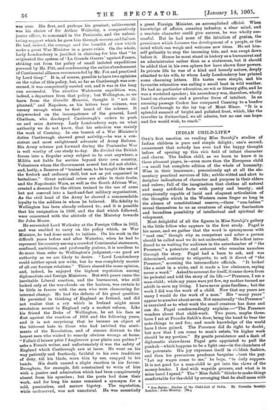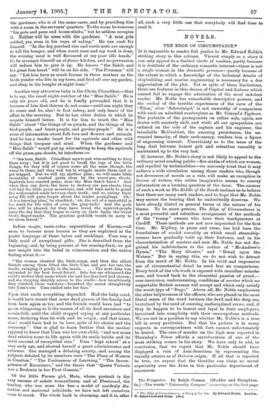ONE'S first emotion on reading Miss Sorabji's studies of Indian
children is pure and simple delight ; one's second, amazement that nobody has ever had the happy thought before of opening up this rich field of infant character and charm. The Indian child, as we learn to know it in these pleasant pages, is—even more than the European child —a small but complete edition of the whole of humanity. Wise in their innocence ; precociously apt at all the ele- mentary practical services of life; subtle-witted and alert to decipher indications of character and purpose in their elders and rulers ; full of the imagination that clothes all natural and many artificial facts with poetry and beauty ; and exceptionally capable of lucid and eloquent articulation of the thoughts which in the Western races linger so long in the silence of constitutional reserve,—these "sun-babies" reveal themselves to us as creatures of singular fascination and boundless possibility of intellectual and spiritual de- velopment.
Most delightful of all the figures in Miss Sorabji's gallery is the little fellow who appears in the first study. Pagel is his name, and we gather that the word is synonymous with " mad one," though why so competent and sober a person should be called mad we do not understand. He is first intro- duced to us waiting for audience in the antechamber of " the Presence," a potentate and autocrat who remains nameless through the story. Pagal had a boon to ask, and was determined, contrary to etiquette, to ask it direct of "the Presence," scorning the intermediate officials. " It looked like a saint in a niche, and it made a low obeisance, saying never a word." Asked to account for itself, it came down from its pedestal and told the story of its life :—" Presence, I am a man-child ; while my years were yet few, my mother turned me adrift to earn my living. I have never gone foodless ; but the work I did was the work of a child. Now that my years are many I would do the work of a man." His " many years" appear to number about seven. Not unnaturally "the Presence" is exercised as to what work the small creature has done and can do. Pagel condescendingly explains The Presence wonders about that child-work. Two years, maybe three, have I sat at Prondie Sahib's door, being the hand to bear the note-things to and fro; and much knowledge of the world have I thus gained. The Presence did do right to doubt; but now that I am come to man's estate, 'tie higher work should be my portion." By gentle persistence and a dash of diplomatic shrewdness Pagel gets appointed to pull the punkah—which happens to be a light one—in the chambers of the potentate. His joy expresses itself in childish fashion, and then his precocious prudence bargains about the pay. "Let my wages come to me," he begs, " in daily coppers. It is not good for a man-child to get into the claws of the money-lender. I deal with wayside grocers, and what is in mine hand I spend." The " Miss Sahib " thinks to make things comfortable for the child by arranging that he shall mess with Sun-Babios : Studios of tho Child-Lio of India. By Cornelia Sorabji, London : John Murray. [68.1 the gardener, who is of the same caste, and by providing him with a room in the servants' quarters. To the room he removes " his pots and pans and house-sticks," but he seldom occupies it. Neither will he mess with the gardener. " A man gets settled, yes, even in his ways of eating." He can cook for himself. "In the day parched rice and earth-nuts are enough
to kill the hunger, and when court rises and my work is done, the evening meal is well flavoured at my poor idle hands?' So he arranges himself an alfresco kitchen, and no persuasion will induce him to give it up. He knows " the Sahib and his great lion-heart" will be on his side. " The Presence" will say: "Let him have as much license in these matters as the birds yonder who litre in my trees, and feed all over my garden, and sleep in the boughs at night time."
Another very attractive baby is the Chota Chaudikar,—tbat is to say, the small night-watcher of the " Miss Sahib." He is only six years old, and he is fondly persuaded that it is because of him that thieves do not come—until one night they do come, and he, alas ! is fast asleep, and only hears of the affair in the morning. But he has other duties in which he acquits himself better. It is for him to teach the " Miss Sahib" about "the things of us-people, and the things of the God-people, and beast-people, and garden-people." He is a mine of information about folk-lore and flowers and animals. And be has a tender heart for the squirrels and other wild things that trespass and steal. When the gardener and " Miss Sahib" would put up wire-netting to keep the squirrels off the green-pea shoots, he interferes :—
" See here, Sahib. Chaudbari says to put wire-netting to keep them away; but it is not good to break the legs of the little things, for they will of course come all the same though the wires be there, and they will try to wriggle inside them and so get trapped. But we will try another plan; we will make little mountains of roasted grain close by the sweet-pea shoots. Squirrels love roasted grain; does the Miss Sahib know ? And when they run down the trees to destroy our pea-shoots, they will find the little grain mountains, and will turn aside to grind the well-roasted seeds between their teeth ; and so, eating their noisy fill, will quite forget about the tender younglings. Oh ! it is a knowing plan,' he chuckled; oh, the wit of a man-child is too much for the wiles of even the grey-tails! And the gods also will be pleased, for they have loved the squirrel-people since the day that they began to carry on their backs the Great God's finger-marks. The gracious god-folk would be sorry to see them lamed."
Indian magic, caste-rules, superstitions of Karma,—all seem to become more human as they are explained in the poetic language of these babes and sucklings. Uma was a
little maid of exceptional gifts. She is described from the beginning, and, by being present at her naming-feast, we get new insight into the belief in reincarnation and the native feeling about it:—
" The women chanted the birth-songs, and then the oldest friends among them lifted the little Uma and put her into the
cradle, swinging it gently to the music The next duty was entrusted to the best loved friend. Into her ear whispered the child's mother that name which she and her dear lord had chosen ; and she stepping daintily across to the cradle—how breathlessly they watched, those watchers—breathed the secret straightway into Uma's ear. Uma smiled into her face."
Upon that smile everything depended. Had the baby cried, it would have meant that some dead person of the family had been born again in her, and the friends would have had " to go on whispering to it the names of all its dead ancestors and cousin-folk, until the child stopped crying at any particular name, declaring thus its wish and its origin; and that name,
alas ! would have had to be hers, spite of the choice and the ceremony." One is glad to learn further that the mother rejoiced to know that Uma was her own child, " and not some dead relative come to life again with its senile habits and its
debit account of unrequited sins." Uma " kept school" at a very early age, and showed herself a great administrator and reformer. She managed a debating society, and among the subjects debated by its members were "The Place of Women in Creation," " The Uselessness of Learning," " The Incom-
petence of Examiners," and the thesis that " Queen Victoria was a Brahmin in her First Genesis."
Of the little Parsee girl, Hera, whose portrait is the very essence of sedate womanliness, and of Fleetwood, the tomboy, who was none the less a model of maidenly dis- cretion and maternal solicitude, we have not left ourselves 'vow to speak. The whole book is charming, and it is, after
NOVELS.







































 Previous page
Previous page